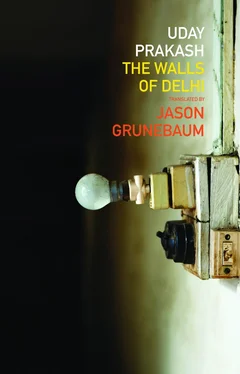Sometime during that year I went for six months to Bombay and Pune in connection with a film I was writing. And even after I got back, I wasn’t able to see Chandrakant for another seven or eight months: that’s when I was busy editing a couple of small documentaries. The day-to-day struggles of getting by had, in some sense, led me to begin to forget about Chandrakant. And then one day I went to the Auliya shrine, thinking about going back to the village, a place where everyone escapes to run off to the big city, and where the fearful jaws of hunger, joblessness, and penury await every man who returns — when I sat down, alone, and saw that my friend Naim Nizami was sitting next to me with a smile.
‘It’s been forever since I’ve seen you here,’ he said. ‘Your friend who came with you, Chandrakant, he was here two months ago and arranged a twelve-thousand-rupee feast. And we were thinking of you. The biriyani was delicious.’
‘Really?’ I asked. Could Gulshan Arora, his seventy-yearold boss from the Kwality Departmental Stores have died and left him with two hundred thousand rupees? But Naim Nizami said that it was because his prayer had been fulfilled: he had become a father, even at his age. All on account of the mercy of Hazart Nizzamuddin, mehboob-e ilahi — l’amoureux de la divinité.
What else could I do that day but head straight for Jahangirpuri and Chandrakant’s half flat? I arrived at dusk, sometime after five. Two planks of wood were bolted across the door, and a fat lock was fastened on the door chain. A board covered the ‘balcony.’ The woman who lived next door told me, ‘They’ve gone to Saharanpur and will be back by Saturday. The baby’s sick.’
I went again on Sunday, and this time found them. Worry lined Chandrakant’s face, but what I thought had happened hadn’t. Shobha was weeping. They told me that four months ago, Shobha had given birth to a baby boy in the nearby Kalpana Health Centre. The doctor was quite surprised that this middle aged woman, nearly an old woman, and who hadn’t given birth in many years, could give birth to a baby whose vitals were perfectly normal. Shobha only needed a little stitching up. The baby was a fat eight-and-a-half pounds, and was rosy red. He was born on the fifth day of the tenth month. Chandrakant and Shobha’s joy knew no bounds, and they returned home from the hospital. Shobha, having lost seven children before, was apprehensive. This time they wouldn’t even let the most minor suspicion go unchecked, but the doctor told them every time they brought him in that the baby was healthier than health itself. There wasn’t the slightest cause for alarm. Still, mother and child went in for the free checkup every week for two months. This time they wanted to take every precaution possible.
Some ten weeks passed like this. Chandrakant donated twelve thousand at Auliya’s shrine for meals for the destitute. Shobha made a deal with Balaji of Tirupati: if the baby made it past twelve months without any problems, she would travel to Tirupati to perform the ceremonial head-shaving ceremony for the boy when he turned one, and would give the shorn hair to Balaji as an offering.
But one night Shobha heard the baby crying out as if in mysterious pain. Every breath he took was accompanied by a strange whistling-wheezing sound.
When she looked at the boy’s face, she was amazed: she felt the baby was hiding his pain. He wasn’t crying in the least, but silently fighting the pain on his own. Little furrows appeared on his forehead as if he were giving all he had in order to breathe each troubled breath.
It was two or three in the morning, and, now worried, Shobha woke up Chandrakant, who himself examined the infant. After another hour or two, the baby was again sleeping soundly, breathing deeply and regularly.
And the next morning, he was absolutely fine, drinking milk hungrily from Shobha’s breasts until sated. Placing a finger beneath his lips caused him to burst into laughter, and he flashed his toothless gums. He began to recognise both mother and father, and Chandrakant’s mind eased a bit. He said to Shobha, ‘He probably had some mucus caught in his throat last night, and that’s why he sounded like he had a whistle stuck in there. It’s also been a lot colder lately, but I don’t think it’s something we need to worry about, it was probably just a mild cold. I’ll mix a little bit of brandy in with his milk.’ The hospital had given them a bottle full of brandy.
Shobha organised a small coal stove that would keep the baby warm from the damp chill outside. She hung a couple of old sheets and a rug from the top of the outside door frame to keep drafts out. Chandrakant sprinkled DDT powder and poured kerosene into the drainage ditch in front of their house in order to make sure mosquitoes and bacteria wouldn’t breed. The two of them did everything that they could think of in order to be conscientious.
They named the boy Suryakant, and affectionately called him Suri.
This continued for a couple of weeks, until one night Shobha woke with a start to find Suri whimpering. Once again, his forehead bore the traces of intense pain, little wrinkles that ebbed and flowed as he silently struggled against deep discomfort, enduring the hurt, all alone. Any other child would have cried its eyes out.
She noticed that Suri kept trying to grab hold of his head.
Was his head in pain? She touched her palm to his forehead and it was like placing it over hot coals. He had a high fever and was burning up. Shobha shivered. Not again! Not the eighth!
She got up and turned on the light. The bulb was directly in front of the door and the light shone right into her eyes. Chandrakant woke up; he had been out late drinking with Gulshan Arora at his house.
Three months passed: Suri didn’t utter a peep, let alone cry. His languishing face grew crimson, clay-coloured, expressionless, lost in pain. He wheezed like a whistle with each breath, and continually tried to grab hold of his head with his tiny hands.
In the light, Chandrakant and Shobha noticed that despite the severe chill, Suri kept kicking the blanket off his body, and drops of sweat glistened on his forehead.
Suri suddenly gave Chandrakant a look that gave him a start. The three-month-old boy who was quietly struggling with his suffering, looked at his father with a gaze that held both heartbreak and dignity — fathomless pain, but not begging for help. His own boy wore a face that told the story of a solitary struggle with hurt, a tiny, innocent face suggesting exhaustion at having lost a battle, or being stuck in a worry. So this one too? He nearly broke down.
‘He’s burning up,’ Shobha said, taking Suri into her lap to try and soothe the boy. She froze. The boy’s head dangled down as if his neck were lifeless, as if his head and torso were independent parts with no stable connection. Frightened, she placed her hand behind his head to steady it, unbuttoned her top, and placed his mouth flush to her breast. She was flustered and the only thing she could think of at the moment was to nurse him — it seemed like the most important thing in the world, and she hiccupped, on the verge of tears.
The baby’s head on her chest felt like a pot out of the kiln. She nervously pressed her nipple into his mouth — it seemed he was hungry, or had at least found relief from his misery in her breast. Charged with great urgency, he alternately sucked on each breast in a nervous frenzy. Shobha was flush with a riot of maternal feeling for her boy, a sharp sensation that caused her nipples to swell and the blood in her body to rush in an urgent biochemical manufacture of milk to get it to the place where three-month-old Suri — in spite of his mysterious fever, inescapable pain and hunger — drank quietly and without crying. That night the sound of his gulping down his mother’s milk could be heard echoing through the half flat. Shobha felt every vessel in her body had transformed into countless rivers of milk that served her swollen breasts. Her body quivered with a faint thrill. A primal, otherworldly, inscrutable music shot through the millions of cells and vessels in her body that transformed blood into baby’s milk. Here in this world, only women can sense this music and understands its meaning.
Читать дальше










